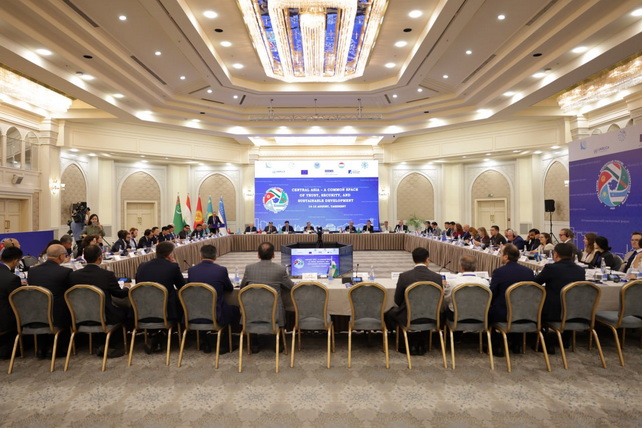
Eldor Aripov: Central Asia Is a Successful Example of Regional Cooperation
Eldor Aripov: Central Asia Is a Successful Example of Regional Cooperation
Tashkent, Uzbekistan (UzDaily.com) — The 8th Central Asian Expert Forum (CAEF) opened today in Tashkent under the theme: “Central Asia — a Shared Space of Trust, Security, and Sustainable Development.”
In his opening remarks, Eldor Aripov, Director of the Institute for Strategic and Interregional Studies under the President of the Republic of Uzbekistan (ISMI), noted that “the CAEF is turning into a laboratory for generating new ideas and proposals aimed at strengthening the vector and architecture of regional cooperation.”
He stressed that the countries of the region have already made considerable progress toward rapprochement and consolidation. According to him, Central Asia has developed a stable and, in many ways, unique model of interstate interaction that ensures stability, security, and sustainable development. “Against the backdrop of global turbulence, Central Asia is one of the few successful examples of effective regional cooperation in the world,” Aripov stated.
In this context, he highlighted the importance of the Consultative Meeting of the Heads of State of Central Asia, initiated by President of Uzbekistan Shavkat Mirziyoyev in 2017. This format, he said, has become a reliable mechanism for strengthening the institutional and legal framework of regional cooperation.
“More than twenty significant conceptual documents have already been adopted, including long-term ones that set the priorities and mechanisms for our cooperation in key areas,” he added.
He underlined the historical significance of the Khojand Declaration of Eternal Friendship, signed in March by the Presidents of Uzbekistan, Kyrgyzstan, and Tajikistan. “It symbolically put an end to all disputed territorial issues and marked a new era of openness, dialogue, and good neighborliness in interstate relations,” Aripov stressed.
A major step forward, he noted, was the creation of the Council of National Coordinators for the Consultative Meetings of the Heads of State of Central Asia.
As a result, Aripov emphasized, all countries of the region have benefited from regional cooperation: “Whatever sphere we look at, we have fairly good results.” At the same time, he said, moving forward requires focusing on improving existing mechanisms and institutions, as well as implementing the agreements reached at the Central Asian leaders’ summits.
He expressed hope for the successful completion of negotiations on the Treaty on Friendship, Good Neighborliness, and Cooperation, underscoring its importance for the future of regional integration.
Economic cooperation, Aripov noted, is now coming to the forefront: “Our mutual trade is growing, but it still remains at a low level — intra-regional transactions account for just over 8% of total trade.” Key barriers, he said, include limited markets and logistical dependence. In this regard, he recalled President Mirziyoyev’s strategic goal of forming a Single Regional Market in the long term. Achieving this will require eliminating trade barriers and digitalizing logistics. He cited the Uzbek President’s initiative to launch a Central Asian Economic Council for regular meetings at the deputy prime ministerial level.
He also stressed the importance of creating financial instruments to support cooperation, recalling proposals to establish a Central Asian Investment Council and a Bank for the Innovative Development of the Region.
Turning to security cooperation, Aripov stressed the need to develop a common vision and approach. “The foundation could be the initiative of the President of Uzbekistan to develop and adopt a Concept of Regional Security and Stability in Central Asia. The draft of this document was already presented during the second meeting of the secretaries of security councils of the Central Asian states, held in April this year,” he said.
Finally, Aripov emphasized the importance of cultural and humanitarian cooperation, noting that the long-term sustainability of regional integration depends heavily on a strong social foundation built through humanitarian and youth initiatives. He highlighted proposals by President Mirziyoyev to develop a Central Asian program of educational and academic exchanges, conclude an agreement on the mutual recognition of degrees from leading universities in the region, and provide reciprocal scholarships for gifted students.
“I am deeply convinced that such initiatives create the societal foundation for integration, ensuring support for the regional agenda in the long term, regardless of political circumstances,” Aripov concluded.
In this context, he also stressed the importance of strengthening regional identity, noting that the future of regional cooperation will depend on “our ability to form a common value-based foundation for integration and to identify ourselves not only as citizens of our own countries but also as representatives of our common Central Asian home.”
The CAEF is organized by the ISMI, with partners including the UN Regional Centre for Preventive Diplomacy for Central Asia, the EU Delegation to Uzbekistan, the Organization for Security and Co-operation in Europe (OSCE), and the Konrad Adenauer Foundation. The forum traditionally brings together leaders and experts from strategic institutions, research centers, and academia from across Central Asia. For the first time, prominent experts from the EU, ASEAN, the Nordic Council, as well as scholars from Russia, the United States, the United Kingdom, Switzerland, and Azerbaijan have been invited to participate and share experience in regional studies.